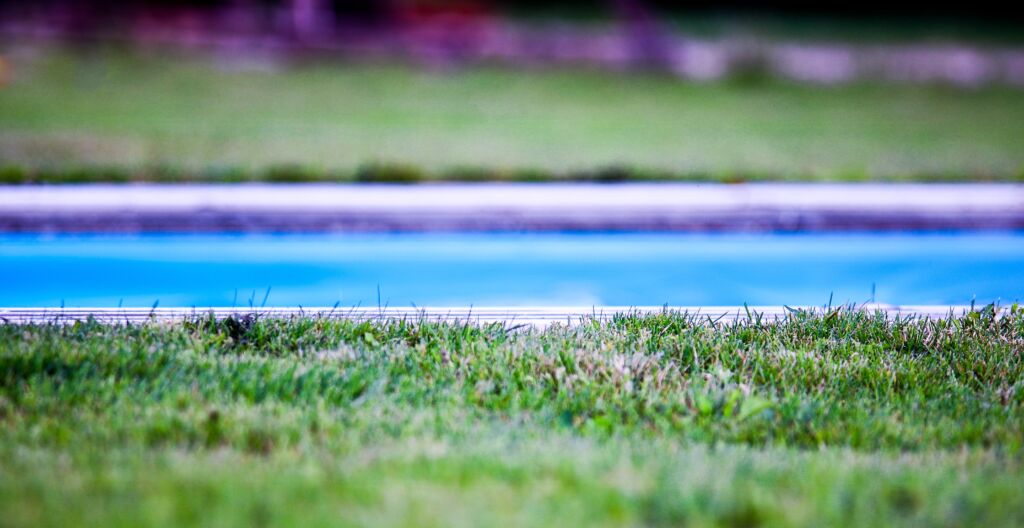While rain can nourish our grass, plants and flowers, it can also harm your outdoor pool water quality if left unmaintained. After all, with heavy rains come potential flooding, muddy water and debris in your pool.
Whether you’re being proactive before a rainy spring season or need to recover after an unexpected rain storm, proper pool maintenance is required to protect the health of your water quality and equipment.
So your pool is ready for swimming when the sun is back, take a look at these tips and tricks on how to care for your pool during a rainy season.
What Does Rain Do to Your Pool Water?
Occasional drizzling or short rain showers are not problematic for your pool; however, larger storms with over 1 to 2 inch rainfall rates per hour could harm your pool’s water quality, surfaces and equipment.
Since rainwater is acidic and nitrogen-rich, it can lower your pool’s pH and negatively affect your water chemistry. In addition to irritating your eyes and skin, acidic pool water can render your sanitation and disinfection ineffective. So, your pool is not protected from unwanted bacteria and contaminants.
The most problematic part of heavy rainfall is that the acidic, nitrogen-rich water creates a perfect condition for algae to bloom. Nobody wants to be surprised by green water with algae on their pool’s steps, floor or walls.
How to Care For Your Pool Before It Rains
If the weather forecast is predicting heavy rainfall, follow these proactive steps to keep your pool water clean and healthy:
- Balance your pH and alkalinity in advance to keep your water chemistry in range.
- Shock your pool water and even raise the chlorine level 1 – 2 ppm over what is normally recommended or needed.
- Remember, preventing algae is key to keeping your pool surfaces clean. So, keep an algaecide in the water for defense against an algae outbreak.
- Brush your pool’s surfaces. Regularly brushing your pool walls and floor can help remove any small algae particles so that they circulate into the filter.
- Always follow your filter cleaning schedule. Clean your pool filter by following the manufacturer’s cleaning instructions.
How to Care For Your Pool After It Rains
Proactive pool maintenance is the best practice for keeping your pool water clean and clear during a rainy season. However, your schedule can get busy and a rain storm could catch you by surprise without enough time for preventive pool maintenance. If this is the case, don’t panic. You still have ways to treat your pool during or after a storm. After a heavy rainfall, follow these pool care steps:
- Excessive water runoff could bring dirt, mulch, grass and other debris into your pool. So, use a skimmer net or leaf rake to remove large debris from your pool water.
- Remove any remaining fine debris from your pool’s floor with a roller vacuum head.
- If algae has bloomed, use an algaecide and brush it off your pool’s surface, steps, walls and floor.
- Ensure the skimmer baskets and line basket are not clogged with debris and that the pump is working at normal rates. This will ensure the algaecide circulates around the pool to prevent algae from growing.
- Maintain proper disinfectant levels and balance your pool water’s chemistry to the proper levels. After a rainfall, it is important to monitor your pH and alkalinity.
- Super chlorinate the pool water with a chlorine shock to kill off any growing algae.
- Maintain proper filtration. A good filtration system can trap dead or circulating debris and algae.
- If an excess of soil and mulch got into your pool during a rainstorm, use a phosphate remover. Please note: Using a phosphate remover is also a good preventative practice throughout the regular pool season if your pool is regularly exposed to nature’s organics.
If your pool still needs assistance after a heavy rainfall, please contact your local pool service company. Your pool service professional can help with any additional challenges, like equipment flooding failures, cleanup from low lying flood-prone areas, etc.
Whether before or after a rainstorm, following the steps above will help protect your pool and keep it prepared for a rainy season.
If you are looking for the easiest way to keep your pool healthy year-round with drinking-water chlorine levels or less, Clear Comfort’s award-winning AOP pool sanitation could help. To learn more, click here.




